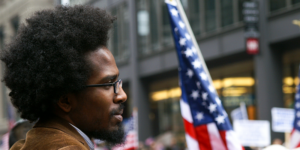
How to Live out Your Faith in the Public Sphere

As a Christian, you may ask yourself at times how to live out your faith in the public sphere. Injustices are occurring in the world around us every day. Because your faith doesn’t allow you to ignore these happenings, you feel a strong desire from within to take productive action. Some people choose to take harmful action but your desire is to take action that heals, that works towards justice and that shows God’s love for humanity. This is what we should aim to do, and my goal is to help you begin to think of ways you can live out your faith while having a positive impact on the world around you.
We are called to live out our faith and have an impact on society. A verse in the scriptures that reiterates this calling is Micah 6:8, which says “He has told you, O man, what is good; and what does the Lord require of you but to do justice, and to love kindness, and to walk humbly with your God?” In this verse Micah points out what God requires of us. We are to do Justice. How are we “to do Justice”? What does that mean for us? Justice comes in different forms. We can do Justice by lending help to the parent who is struggling to put food on the table and is earning just enough to put a roof over their children’s heads. We can lend our help by offering to buy them groceries, maybe filling up their car with gas or connecting them to resources that can give them financial assistance and build their credit. We can do justice by assisting the homeless in our community to find shelter and get them connected to resources that will supply them with food and daily necessities. We can do justice by giving our time, talent and treasure to community organizations that give back to youth, those who are less fortunate and those who are struggling to make it each day.

These are some ways we can do justice on an individual basis. To those who already do such acts regularly, I commend you. Continue this good work. However, there’s also a need for justice on a systemic level within our society. As Christians, we are to follow the example of Christ, and stand beside those who are looked down on and mistreated by society. We have the capability to do justice on a systemic level by advocating for changes within our systems. We should advocate for opportunities for disadvantaged youth. Whether that be through mentorship programs, academic tutoring, pouring more resources into historically underfunded schools and giving families more choices as to where their child can attend. We should advocate for those who are battling unfair sentences in the justice system and creating opportunities for those who have paid their debt to society, in an effort to reduce recidivism rates. We should aim to provide more accessible opportunities for employment, educational opportunities, and programs for financial and civic literacy once they are released. More people should focus on advocating for those struggling with mental health issues and substance abuse. These are initiatives that would exhibit justice as Micah 6:8 led us to do.
Our participation in advocating for policy and systemic change in the public sphere is crucial. Many people believe their voice doesn’t matter, and as a result they don’t bother to vote or advocate for change. I can understand why many feel this way. However, inaction by good hearted people doesn’t get us further towards justice at all. Our government is supposed to be by and for the people. That means we the people of the United States have a voice and can move our government through civic engagement to reform laws and systems to deliver true justice. We can have a great impact especially on a local level. For example, after the terrible deaths of George Floyd and Breonna Taylor many cities across the country were pressed by citizens to take action against not only police brutality but racial injustice on a broad systemic level. That means in education, voting, criminal justice, and especially public health as the COVID-19 pandemic exposed the inequities in our health care system. With much to be addressed U.S. cities and state governments passed their own policies in an attempt to tackle racial injustice. In my home City of Middletown, CT where I am a member of the City Council, we decided to establish a Task Force on Anti-Racism. This Task Force was given the charge to find policy solutions to systemic racism wherever it exists under our jurisdiction. My colleagues and I received numerous emails from residents calling for change. The establishment of the Task Force was a response to residents’ call to action and would be the beginning of furthering justice within our own community. This is one example of how people can make a difference and move our government from stagnation and lip service to action and moving in the right direction. I encourage you to believe that your voice matters. Someone is waiting for you to stand up for the cause of justice.

With myriad issues that need to be addressed it’s easy to feel overwhelmed. You don’t have to figure out how you will be an advocate for all of them. I encourage you to look at the example of Christ. He advocated for those who were hungry, sick, outcasts and shamed. He even advocated for you before you were born so that you may have life more abundantly. If you use your time and energy each day advocating for justice, you are advocating for those who are facing current circumstances as well as generations to come. Remember, to do justice is to take action that creates a society where everyone has the opportunities, tools and resources to fulfill their God-given potential. Justice can be restorative instead of further tearing individuals down.
I focused in the previous passages on how we “do justice.” However, those actions are to love kindness and walk humbly as well. When we reach out our hand to help and advocate for others who society would rather turn their backs on, we extend kindness. When we set aside our pride and consider the circumstances of others instead of solely focusing on our own, we begin to walk humbly. I challenge you to think about what issues in your community you can begin to advocate for that would further the cause of justice. What Town Hall meetings can you attend to advocate for justice? What issues can you write your Legislator or Mayor about? If you don’t know who these individuals are, I encourage you to research them. As you begin to walk in the requirements of Micah 6:8, you will be living out your faith in the public sphere.
